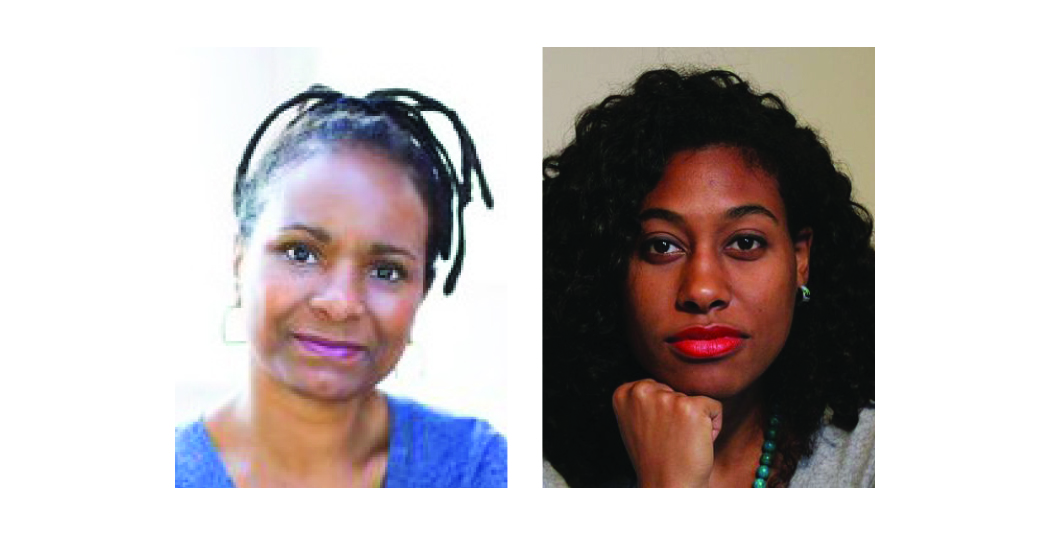By Alana Bittner
When expressing the value of writing poetry, Valencia Robin references a quote by U.S. Poet Laureate Joy Harjo: “You begin to learn to listen to the soul, the soul of yourself in here, which is also the soul of everyone else.”
Robin says that, when she was young, no one told her poetry could work this way. In high school, the poets she learned about felt “archaic” and intimidating, with little connection to her own life. The urge to write poetry didn’t arise until years later, when she discovered contemporary poets she could identify with. Today, Robin is an award-winning poet whose work has appeared in The New York Times, The Virginia Quarterly Review, and Black Renaissance Noire, to name a few.
With support from New City Arts, Robin has paired up with poet and pediatrician Irène Mathieu to help Charlottesville teens find the connection to writing that she feels she missed out on as a young person.
“It’s empowering when a person can take control over their own narrative and say what they need to say, exactly how it needs to be said,” says Mathieu.
In February, the pair put out a call for writers that expressly welcomes high school students of color, queer and nonbinary students, low-income students, immigrants, and differently abled students to participate in Poetry of Power, a virtual workshop for young people from marginalized backgrounds. (Scroll down for samples of submitted poems.)
Robin and Mathieu hope to dispel the misconception that poetry is grim or somber. Instead, Robin says they’ll introduce students to “poetry that privileges joy.” This joy can be a form of empowerment, she says, pointing out that “what has sustained communities of color and other marginalized groups is our creative spirit, our songs and poems and other forms of art.” Robin says the idea of “joy and poetry as tools for survival” inspired the name of the workshop.
She cautions, however, that poetry is not a magic wand that will solve all problems. It is a tool that allows “all poets, whether young or old, to make sense of what’s going on in their lives, to unpack what’s confusing, joyful, or painful, and figure out how they feel about it.”
Adolescence brings confusion, joy, pain, and other intense emotions. Through writing, young poets can wrap their minds around whatever they may be struggling with, emerging with a sense of satisfaction and accomplishment. “To capture your particular way of walking in the world is incredibly empowering,” says Robin.
The workshop addresses the logistical aspects of writing poetry as well. Students get career advice, free author headshots, and the chance to perform their work at a virtual public reading. Organizers have also invited a guest speaker, local student activist and writer Zyahna Bryant, who organized her first demonstration against police injustice at age 12 and published her first book of poems, Reclaim, as a high school senior.
“She’s living proof that age is just a number, that if you feel called to speak and serve, you’re never too young,” says Robin.
Reese Bryan, Nhandi Hoge, Zoe Shelley, Violet Tillman, Autumn King, and Madeline Caduff present original poetry during a virtual reading on April 1. For more information, go to newcityarts.org.
SAD
By Violet Tillman
They say that absence makes the heart grow fonder,
And perhaps that is true
I missed the rain during that ice and snow,
and then,
After a long winter of stark forests,
As wisps of life sprouted up from grey soil
My love for the earth flared bright and bold
I’d clawed at each scrap, clinging to any warmth and calling it
spring
Here I am now, April
standing in the forest, putting blackberries in my basket
Tasting a few, seeds stuck in indigo teeth
That soft and whimsical voice calling to me—
Frogs in the creek at dusk, flowers shifting in the breeze, drizzle on the tin roof—
Ushering me out to the cliff by the swollen river that overlooks the hills
Where I end my day to the sun setting low,
Warm
And so, it’s like this:
Stars peek out from clouds
That lingering scent of rain
Wafts up near the trees at the edge of the yard
Where I am lying and thinking quietly that
Absence made my heart grow desperate
While presence, this presence
Was what made my heart grow fond
Girl Team
By Zoë K Shelley
You know what’s sad?
I get told my stomach
Is scandalous
My breasts are bad
Something to be saved for a
Supposed husband?
I don’t agree
You know what’s sad?
Some boy barely older than me
Brings out a phone
And tries to stealthily snap
Several shots
Of me in my swimsuit
But I see him
I don’t know him
He’s sitting all the way over there
What can I do for myself?
How do I save my dignity?
You know what’s sad?
I get told that I shouldn’t wear a bikini
But my brother doesn’t have to wear a shirt
Society, what have you done to me?
I need a support team
You know what’s sad?
When I ask my girl friends
If this happens to them too
Each one has a similar story
But something makes me happy
I have a girl team
Always supporting me
All my stories
And my stress
They listen
When I’m with them
I feel free of
Societies grip on me
I’m grateful
For my girl team

